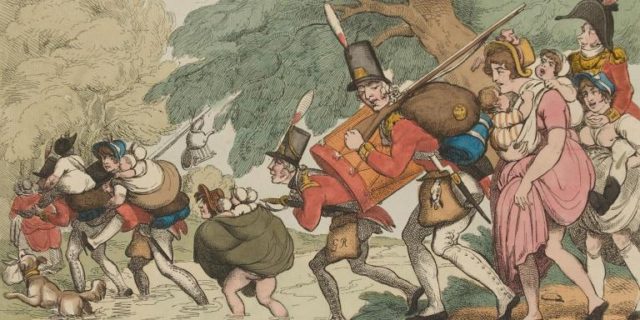
By
Lynn MacKay
January 2018
Print Version
What you need to know
Historians have long puzzled over the relationship between the working class and governing elites. This problem results from the fact that there are few sources available reliably describing the strategies, tactics, aspirations, and preferences of ordinary men and women of the past in dealing with authority.
Why this research is important
One of the few instances where evidence of the relationship between the working class and governing elites does survive, concerns the wives of British soldiers during the nineteenth century. The story that emerges does not show army and government authorities in a flattering light. The lot of these women was difficult. The army and the government tried to discourage the marriage of soldiers, fearing that concern for dependants would lessen their ability and willingness to fight for the country and that such families would be expensive to maintain. Accordingly, official support for soldiers’ wives and children was reluctant, meagre, and often callous, which frequently resulted in real hardship for these families. Wives often were not allowed to accompany their husbands on the many overseas postings that were the norm for the British army in the heyday of the empire. These women were stranded on quaysides as their husbands sailed away with their regiments; they were left to cope however they could in an era in which authorities provided no mechanisms or compulsion for soldiers to transmit money home. Given that regiments typically spent up to a decade or more overseas, and up to twenty years if sent to India, this treatment effectively destroyed these family units. Wives who did manage to get permission to accompany their husbands were subject to army discipline and its many regulations, and had to do backbreaking work—usually laundry—for very low pay in exchange for the food and shelter provided by the army.
In spite of the treatment, which to modern sensibilities seems heartless, soldiers’ wives were not passive victims. Most of them were shrewd, independent, and often willing to fight for better treatment from the immensely more powerful army and government authorities. By the 1870s, the army and the government did begin to initiate reforms that by the 20th century would result in decent housing, education, and financial support for military families, but did so without any real understanding of their needs or consultation with them. Again many soldiers' wives at times demonstrated both a canny ability to reshape support programmes to meet their actual needs and to support each other when faced with hardships resulting from ill-conceived policies and practices.
How this research was conducted and what the researcher found
Research for this project required many long hours in the British government and regimental and army archives copying letters, muster rolls, officers' reports, census data, and memoirs among other documents. Statistical analysis was used to identify patterns of behaviour—who the women were that soldiers married, where they came from, what their occupations were before marriage, how many children they had, and what happened to them when their husbands died or retired. Regimental records were read closely to tease out the wives' reactions to and manipulation of the regulations to which they were subject. Letters and memoirs gave a human face to these patterns, as did several thousand newspaper articles from the period. The latter described everything from murderous jilted financées of soldiers, to wives wounded in conflict zones, to those driven mad on postings to the Canadian wilderness.
How this research can be used
The story of these women, while often deeply moving, at times infuriating, and occasionally funny, begs the questions of what value it might be and what we can learn from it. While few groups in Western society today face the particular problems besetting these women, and societal expectations with respect to appropriate levels of income and living conditions have changed quite dramatically, telling their tale nevertheless matters. First, because of the rich archival records, it offers a rare window into the dynamics of class relations during this period. Second, recounting the story of these women helps to demonstrate the absolute necessity for centralised bureaucrats to consult, to listen, and to collaborate with clients when shaping initiatives to better lives. Top-down solutions did not work well for 19th century army wives; nor do they often do so today. If the past cannot provide us with ready-made solutions to our problems, it can identify dysfunctional approaches that we need not keep repeating.
About the Researcher
Keywords
- army
- authorities
- government
- soldiers
- wives
Publications Based on the Research
Lynn MacKay has published extensively in the field, with articles appearing in a number of peer-reviewed journals.
MacKay, L. (2013). Respectability and the London poor, 1780-1870: The value of virtue. UK: Routledge.
MacKay, L., & Hurl-Eamon, J. (forthcoming in 2018). Women, families, and the British Army, 1700-1880. UK: Routledge.
Editor: Christiane Ramsey
Read more BU Research
Research at Brandon University follows comprehensive policies designed to safeguard ethics, to ensure academic integrity, to protect human and animal welfare and to prevent conflicts of interest.

